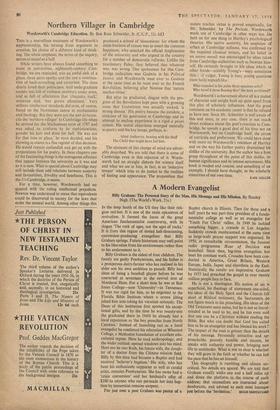A Modern Evangelist
Billy Graham: The Personal Story of the Man, His Message and His Mission. By Stanley High. (The World's Work, 21s.)
IN the deep South of the US they like their reli- gion red-hot. It is one of the main epicentres of revivalism. It formed the focus of the great American fundamentalist controversy, with its slogan `The rock of ages, not the ages of rocks.' It is from this region of tented hell-threatening, conversion-producing evangelism that Billy Graham springs. Future historians may well point to his liberation from his environment rather than to his enslavement to it.
Billy Graham is the eldest of four children. The family are godly Presbyterians, and his father is a prosperous dairy-farmer who has realised in his elder son his own ambition to preach. Billy had ideas of being a baseball player before he was converted at seventeen in the revival tent of Mordecai Ham. For a short time he was at Bob Jones College—now `University'—in Tennessee. It was too rigid for him, so he migrated to the Florida Bible Institute where a severe jilting jolted him into taking his vocation seriously. The Dean of this institution first spotted his excep- tional gifts, and by the time he was twenty-one (he graduated there in 1940) he already had a local reputation as `the boy preacher from North Carolina.' Instead of launching out as a local evangelist he continued his education at Wheatod College, a Methodist foundation of excellent edu- cational repute. Here he read anthropology, and the wider outlook opened windows into his mind. Here too he met Ruth, his future wife, the daugh- ter of a doctor from the Chinese mission field. Billy by this time had become a Baptist and had • received `believer's baptism.' His wife, who has been his enthusiastic supporter as well as candid critic, remains Presbyterian. She has never had a `crisis conversion' and her husband's offer of , S100 to anyone who can persuade her into bap- tism by immersion remains unspent.
For just over a year Graham was pastor of a Baptist church in Illinois. Then for three and a half years he was part-time president of a funda- mentalist college as well as an evangelist for `Youth For Christ' rallies. In 1949 , he tackled something bigger, a crusade in Los Angeles. Suddenly crowds mushroothed at the same time as large-scale prayer support was organised. In 1950, in remarkable circumstances, the famous radio programme flour of Decision was launched. Since then, big-time evangelism has been his constant work. Crusades have been con- ducted in America, Great Britain, Western Europe, India, Japan and elsewhere in the East. Statistically the results are impressive. Graham by 19S5 had preached the gospel to over twenty million people face to face.
He is not a theologian. His notion of sin is superficial, his theology of atonement one-sided, his ideas, of the Holy Spirit and the Church fall short of Biblical testimony, the Sacraments do not figure much in. his preaching. His ideas of the Old Testament seem naive, but he is not so literal- minded as he used to be, and he has even said that one can be a Christian without reading the Bible. But who can doubt that God has called him to be an evangelist and has blessed his work? The impact of the man is greater than the details of his message. Personally attractive and ap- proachable, patently humble and sincere, he speaks with authority and power, bringing new life to multitudes. What is not so clear is whether they will grow in the faith or whether be can last the pace that he has set himself.
This .biography is rambling and almost un- critical. No details are spared. We are told that Graham usually walks one and a half miles up and down the platform ,in..the course of each address; that counsellors are instructed .about deodorants, and advised to suck mint lozenges






























 Previous page
Previous page